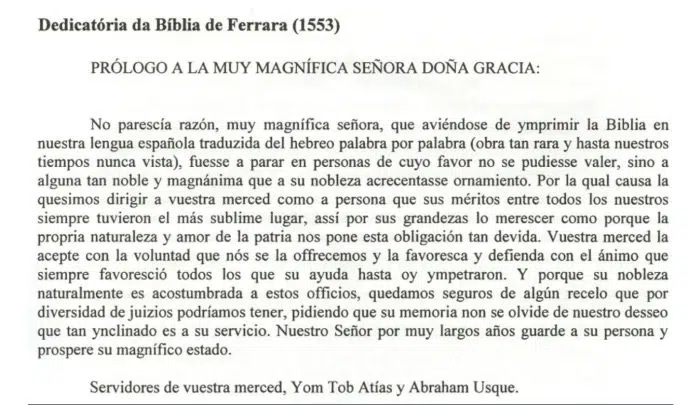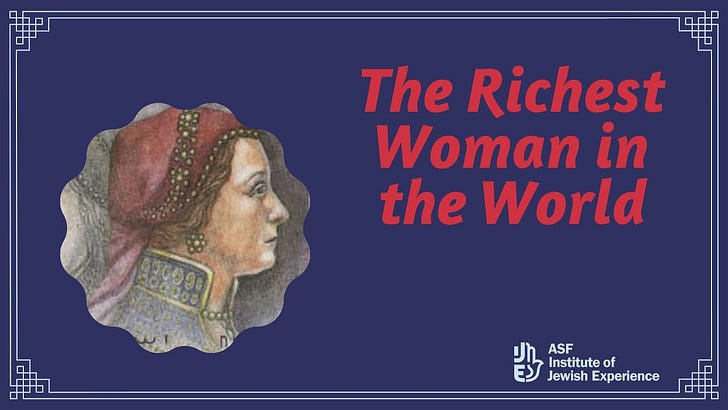Hola. This is Barbara, your curator of cultural news from the Spanish-speaking world. Happy new year to everybody! This is already vol. 42 of my newsletter. 42 sounds like a marathon; yet, it has been an entertaining and charming activity for me to pursue. Let’s see, what is on for this week. I want to introduce you to one of the most prominent women leaders of the Renaissance: Gracia Mendes Nasi, la Señora.
Dona Gracia Mendes Nasi, la Señora
Dona Gracia Mendes Nasi (1510-1569) was one of the greatest businesswomen and philanthropists of her era. A crypto-Jew herself, she developed an important escape network for Jews from the inquisition. Born in Lisbon of Aragonese origin, she moved to Antwerp, Venice, Ferrara, and finally Istambul to flee from the inquisition. Furthermore, she can be called a forerunner of Zionism because she offered the Sultan of the Ottoman empire to develop the city of Tiberias so that Sephardic Jews might settle in that part of Palestine and increase tax income for the Treasury. In 1558, the Sultan granted Doña Gracia the concession of the city of Tiberias and some surrounding settlements. Her nephew Joseph Nasi assumed power over the city. It is not proven, whether she ever made it to Tiberias herself.
The following video gives a good and short overview of her life and impact.
If you have more time, I also recommend Henry Abramson’s talk who is more detailed concerning the historic context, i.e. the expulsion of the Jews from Spain and Portugal and the devastating trail of the inquisition throughout Europe.
Thanks to her immense fortune, she was also a great patron of Jewish scholarship. The Ferrara Bible is one prominent example of her sponsorship, which Abramson names in his talk. The Ferrara bible is a translation from Hebrew to Ladino using the letters of the Latin alphabet. It is an important source for the study of historic Ladino. As you can see below, the editors dedicated one version of this bible to Gracia Mendes.

In addition to Abramson’s sources, I’d like to add two newer pieces of work which deal with the life of Gracia Mendes Nasi. One is an academic biography that can be found online. It is titled The long journey of Gracia Mendes and was written by literary and cultural historian Marianna B. Birnbaum. Birnbaum is a research professor at the University of California, Los Angeles and a guest professor at the Central European University. The second one is a novel which makes it pretty clear that Gracia Mendes deserves her own Netflix series. The film rights of this novel have already been assigned to EOS Entertainment, so it’s just a question of time and budget until we can enjoy a film or mini-series. The novel reads like a telenovela with its many cliffhangers and parallel stories depicting the life and journeys of Gracia Mendes and her family. There are so many turns of fate that I found it hard to stop reading. The author Peter Prange is known for this type of historical novel that has strong women as protagonists. Maybe my analogy is a bit overdone, but the Gracia of this novel appears like a Renaissance Khaleesi: Righteous and intuitive in her acceptance of godly justice, but sometimes so stubborn and principled about her beliefs that she behaves like a fanatic who does not refrain from harming even those she loves most. The novel bears the title Die Gottessucherin (Seeker of God, La buscadora de Dios) and was published in 2009.
In literary terms, the book follows traditional patterns of narrative style and figure forming. However, it is an entertaining and educating read. I found the awkward romantic encounters less convincing, but this is certainly a question of taste. Prange takes his literary freedom concerning the private lives of his figures but sticks very closely to the historically verifiable context.
To sum it up: It is a pity that today Doña Gracia Mendes Nasi is not better known. Her wealth and economic influence can be compared to that of the Fugger family. She helped so many Jews to escape from the Inquisition that everybody should commemorate her as a heroine of her time. However, outside of narrow Jewish academic circles, she is little known. Let’s change this together and spread the word.
This is all for this week. Thank you for reading. What else would you like to know about Gracia Mendes Nasi?


